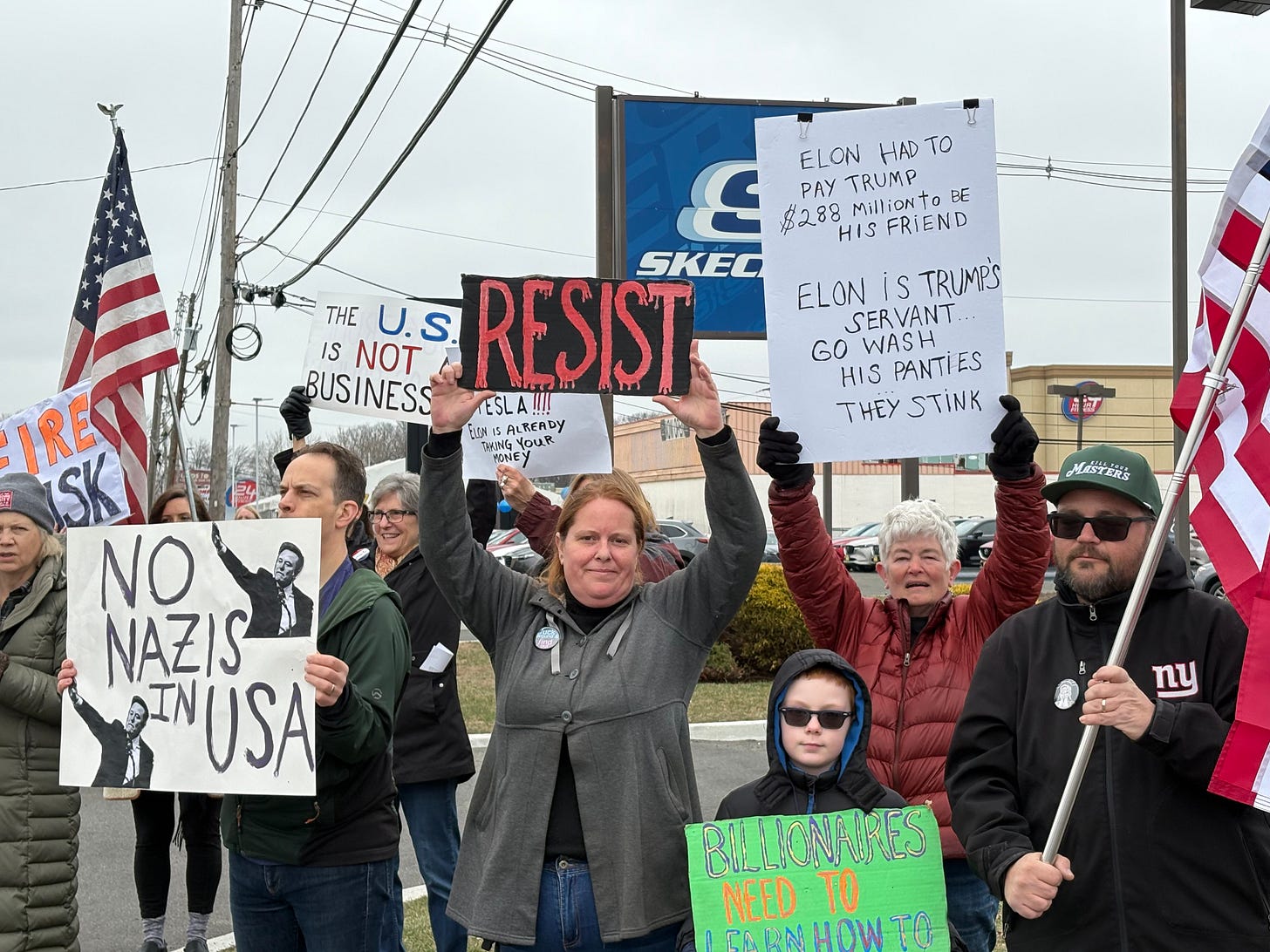‘PROTEST RIGHTS’ COULD FACE THREAT FROM TRENTON BILL, SAYS ACLU
Group wants bill, which passed unanimously, vetoed and amended
In recent weeks, New Jersey has seen loud and vigorous protests at Tesla dealerships across the state, drawing many hundreds carrying signs both political and profane about Tesla’s Elon Musk.
But their right to protest could be threatened by a proposed law sitting on Governor Phil Murphy’s desk, awaiting his signature. Because it is vaguely worded, the bill has raised concern from the ACLU-NJ that it could be used to stifle political dissent and labor protests, said Jim Sullivan, ACLU interim policy director. He warned that the bill’s language is “overbroad, vague and risks undermining fundamental freedoms protected under the First Amendment, including the right to protest and assembly.” The bill (S3507/A4652) passed the New Jersey legislature unanimously last week.
The ACLU-NJ wants Murphy to conditionally veto it, and return it to the legislature with amendments that clarify the wording to safeguard civil rights and make clear it does not apply to peaceful protests or labor picket lines. “We are hopeful that the governor, who has shown a commitment to protecting the First Amendment, will consider the guard rails that we’ve suggested on this bill to protect protest rights for the people of New Jersey,” Sullivan, pictured below, told The New Jersey Democrat.
The bill’s chief Senate sponsor, Senator Paul Moriarty (District 4), told TNJD that he has “no desire to limit peaceful public protest,” calling it “useful, and people should do it.” Moriarty said he will be sitting down with the ACLU, and is working with them on other legislation. “I have an open mind. If there is something we’re missing or they make a good point, we can amend the law,” he said.
The bill creates, with very vague wording, the new offense of inciting a public brawl and it upgrades the penalty for engaging in disorderly conduct. And the bill, which was written to deal with what some South Jersey legislators say are rowdy gatherings of teens and young people along the state’s boardwalks and town events, adds those questionably worded provisions to already existing language, such as a troubling paragraph dealing with “offensive language.” It says someone is guilty of a petty disorderly offense “if in a public place, and with purpose to offend the sensibilities of a hearer or in reckless disregard of the probability of so doing he addresses unreasonably loud and offensively coarse or abusive language, given the circumstances of the person present and the setting of the utterance to any person present.” Do loud chants about the assault on democracy perpetrated by President Trump offend “the sensibilities of a hearer?” Or do chants of “lock her up”?
Which is why the bill’s opponents want it sent back for amendment now, before it is signed into law.
But the supporters of the bill, especially South Jersey legislators who were its prime movers, insist that there can be no further delay in making it law, even if the changes that ACLU wants might be easily amended to the bill. They argue it as urgently needed before the weather gets warm in case there is any repeat of the chaos that ensued last summer when hundreds of unruly teens descended on shore boardwalks and town celebrations. Moriarty referenced last June’s Gloucester Township Day in his district, when at night more than 500 teens, some masked, descended on the town, brawling, throwing items at local stores, and running through the crowds. Ten were arrested, along with two adults. The senator said town officials are already seeing posts on social media by teens making plans to meet up for events this year.
The bill creates the new offense of inciting a public brawl and it upgrades the penalty for engaging in disorderly conduct. A person is guilty of inciting a brawl if “the person acts with purpose to organize or promote a group of four or more other persons to engage in a course of disorderly conduct.” The most severely punishable version of inciting a public brawl would be considered a crime of the fourth degree, punishable by up to 18 months in jail, a fine of up to $10,000, or both. The vaguely defined offense: when “the person acts with purpose to disrupt or cause a disturbance at a public gathering or event or knowing that a disruption or disturbance is likely to occur.”
The bill also makes it a new “disorderly persons” offense to conceal one’s identity. “A person who attempts to conceal or conceals the person’s identity while engaging in a course of disorderly conduct, as defined in subsection a of this section, with purpose to hinder prosecution or avoid apprehension is guilty of a disorderly persons offense,” subject to six months in prison, a $1,000 fine, or both.
The ACLU’s Sullivan is hopeful, that at a time when “we’re in a period in this country when all of our civil liberties and rights seem to be under attack,” changes can be made before the bill is signed into law.
“Mahmoud Khalil, the government went after him for simply protesting, That happened in New York. It could happen here. If we can’t put guard rails and make sure that our protest rights in New Jersey are protected at every step of the way, we have a serious problem on our hands,” Sullivan said.
The legislators wrote this bill in response to pressure from local police officials who believe that tougher penalties, beyond merely fines, are needed to prevent last summer’s incidents from happening again. While he says he is “sympathetic to the problems that the sponsors of this bill are trying to solve,” Sullivan is concerned that “they once again reached for the failed and ineffective tactic of tough on crime, which does nothing but fuel mass incarceration.”
Maybe a companion bill by many of the same legislators that has passed the Assembly and is moving rapidly through the Senate will offer an alternative to this “tough on crime” approach to dealing with young boisterous teens looking for some excitement.
The bill requires the Attorney General to establish a training program for local police forces on how to deal with “flash mobs” and specifically with training to handle crowds of juveniles. Depending on what training plan the Attorney General comes up, with, this could offer law enforcement a chance to show they want to move beyond a “lock em up” approach.







I am really worried Murphy is going to sign it, just like he did with the N OPRA bill. The worst part of this bill is its unanimous vote in the Assembly. Why do they feel so strongly about this? And not strongly enough about Immigrant Trust Act? Rhetorical questions....
Thought we were safe in NJ, this is not acceptable.